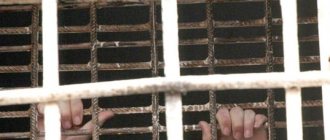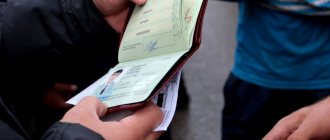Is parole possible under Article 228?
As we have written more than once, parole and the replacement of the unserved part of the sentence with a more lenient form of punishment (MLB) do not stem from the crime, but from how effectively the convicted person is corrected in the institution of the penal system.
According to Article 79 of the Criminal Code of the Russian Federation, a person is subject to parole if the court recognizes that for his correction he does not need to fully serve the sentence imposed by the court.
In addition, the law requires the convicted person to at least partially compensate for the damage. Since “harm” is a rather conditional concept for those convicted under Article 228 of the Criminal Code of the Russian Federation (in most cases there are no specific victims, the crime is considered committed against the entire society), and the approach to compensation can be any.
For example, you can donate money to a charity to combat drug addiction. In our practice, there was also a case when the court recognized the fact that the convicted person worked in a drug treatment center as a volunteer as compensation for harm.
What does deferred execution mean for a drug addict?
According to ICD-10 (International Classification of Diseases), drug addiction is considered a disease. Therefore, the impact of punishment alone will not change the dangerous behavior of a person using illicit substances. Since compulsory treatment is not currently provided for as a punishment, Article 82.1 was introduced into the Criminal Code, providing for the deferment of punishment for drug addicts. To do this, the following conditions must be met.
- The crime is provided for in Part 1 of Art. 228, part 1 art. 231 and Art. 233 of the Criminal Code of the Russian Federation.
- Imposition of punishment in the form of imprisonment.
- Voluntary consent of convicts to undergo treatment and rehabilitation.
- Recognition of the fact of illness by the court.
- Committing a crime for the first time.
Unlike a suspended sentence with an additional punishment in the form of treatment, here there is a limit of up to 5 years. At the same time, Part 3 of Article 82.1 indicates that after completion of treatment and the onset of remission for 2 years, the accused is released from serving the remaining sentence. If he evades treatment, he is sent to the place actually determined by the sentence.
Theoretically, the patient can be cured earlier, which must be confirmed by expert opinion. On the other hand, it is hardly advisable to bother about deferring the sentence when the term of imprisonment is 1 or two years. But in this case, you need to remember that the Penal Code of the Russian Federation provides for the appointment of compulsory treatment for drug addicts based on the conclusion of the medical commission of the penal institution (without a court decision).
How long do you need to serve under Article 228 to get parole?
Article 228 affects the conditions for obtaining parole/ZNBM only to the extent that for persons convicted under this article, an increased period for filing a petition is provided - a petition can be filed with the court only after the actual serving of at least 3/4 of the sentence imposed by the court.
This rule, however, applies only to those whose crimes are recognized by the court as grave and especially grave. Citizens convicted under Part 1 of Article 228 (such crimes are considered crimes of medium gravity) can formally apply for parole after 1/3 of the term has expired, but we have not yet encountered successful cases in our practice - there is noticeable opposition to such requests from both penal institutions , and from the courts.
Probation for drug trafficking
Is it possible to receive a suspended sentence for drug trafficking? Here there is also a difference between judicial practitioners in the district courts of Moscow and the courts of the Moscow region. To receive a suspended sentence for drug sales or unfinished drug sales (attempt or preparation for drug sales) under the first or second part in the courts of the Moscow region is 30%, but in Moscow the chance of remaining free is almost zero. There is a chance, but it is minimal and is only 1% out of 100. For women with children, the chances increase somewhat, but not by much. We repeat once again, a suspended sentence for selling drugs or attempting to sell drugs is possible only for persons with Russian citizenship who do not have a criminal record.
As for parts 3, 4 and 5 of Article 228.1, receiving a suspended sentence is equal to 0% out of 100 in Moscow and 1% out of 100 in the Moscow region.
What factors influence drug probation?
Drugs, probation - this is the most common question that is asked to a lawyer, it all depends on the circumstances of the incident, on the materials that characterize the defendant, whether he works, whether he works or not, whether he has chronic diseases, what specific diseases the defendant has (you will agree that gastritis and severe asthma, this is a significant difference). And of course, the more severe the disease, which is confirmed by medical documents, the greater the chances of remaining free. Another important factor is the presence of minor children. This is a standard list of mitigating circumstances.
The presence of a document issued by operational employees stating that the person was a freelance agent who helped expose persons who traffic in narcotic drugs can greatly influence the suspended sentence. This factor greatly influences the court and can greatly help in assigning a suspended sentence.
How to increase the likelihood of parole for drugs
The possibility of parole completely follows from the post-crime behavior of the convicted person - from how the person reforms. Accordingly, in order to increase the likelihood of parole, it is necessary to convincingly prove to the court that the person has ceased to be socially dangerous.
Good behavior and honest work in a colony are mandatory conditions for parole under any article. Despite the fact that the Plenum of the Supreme Court prohibited judges from attaching primary importance to the presence of incentives and the absence of penalties for the convicted person, in fact, judges continue to consider incentives and penalties as important criteria.
If the penalties are related to drugs, the convict will most likely be denied parole or replacement of the unserved part of the sentence with a more lenient one.
Social activities in a colony are extremely important - a person convicted under Article 228 can become the head of a sports section or conduct public work to promote a healthy lifestyle, tell prisoners about the dangers of drugs, make posters and wall newspapers, and so on. Most likely, the colony administration will support the convict’s desire for such activities, encourage it and confirm it in the parole court.
Another good way to increase your chances of getting parole is to interact with a narcologist. For example, you can correspond with your doctor or invite him on dates.
A good relationship must also be maintained with the prison psychologist. When filing an application for parole, the colony prepares a package of documents for the court. For those convicted under Article 228, it also includes a psychological profile (a certificate from a psychologist). Let him know that you want to get rid of (or have already gotten rid of) your addiction.
Everything about criminal cases
Go to materials in the field of drug trafficking
Conditional sentence under Article 228 of the Criminal Code
| Normative base - paragraph 35 Plenum No. 14 possibility of a suspended sentence for drug offenses - P. Plenum No. 1 prohibition of suspended sentences for serious offenses Is a suspended sentence possible under Article 228 of the Criminal Code? ? Possibility of conditional punishment under Article Case No. 01-0782/2016 Example — suspended sentence (only due to mitigating circumstances) under Petition for special order Example - filing a petition for a special procedure is taken into account as a mitigating circumstance |
Possibility of conditional punishment under Article 228
The difficulty of a suspended sentence under this article is that, in addition to the first part, it is a serious
compound.
And in this category of cases, a suspended sentence is not often applied (see more: For serious offenses,
it is difficult to assign a suspended sentence).
| Part | punishment | severity category | possibility of probation |
| Part 1 228 of the Criminal Code | 3 years | small gravity | high probability |
| Part 2 228 of the Criminal Code | 3 – 10 years | serious crime | low probability |
| Part 3 228 Criminal Code | 10 - 15 years | especially serious | impossible (almost) |
I). For the first part, a suspended sentence is possible
Conditional sentence under Part 1 228 of the Criminal Code
quite achievable.
But the lawyer needs to remember that despite the soft category of this composition, the general rule of Article 56 of the Criminal Code
(that one cannot be sentenced to imprisonment for crimes
of minor
gravity) does not apply to him and a special instruction is made, namely, it says that under this article a real sentence is possible (despite the category of minor severity, even in the absence of
aggravating
circumstances and even when committing a crime for the first time.
II). For the second part, a suspended sentence is difficult
2)
a suspended sentence under
Part 2 228 of the Criminal Code
, but it is quite possible, and it is not always possible to do it right away.
III). According to the third part, a suspended sentence is impossible
3)
A suspended sentence under
Part 3 of 228 of the Criminal Code
is unrealistic.
The thing is. that the third part of Article 228 has a special role. It is clearly intended for drug dealers. Particularly large sizes are usually extremely impressive volumes (judge for yourself: 1 kg of heroin or 100 kg of marijuana clearly indicates that they were NOT intended for personal use). It is clear to the investigation and the court that there was clearly an intent to sell ( 228.1 of the Criminal Code)
. But they DO NOT want to condemn a person for selling (either there is no evidence, or he “bargained” for himself this indulgence). That's when the third part of 228 applies.
(see more details: For especially serious
assignment of a suspended sentence to the composition is almost impossible).
Case No. 01-0782/2016
A suspended sentence was imposed under the second part of Article 228 of the Criminal Code.
| Which defense technique worked in this case: The matter is simple, since the position in the case was based on an admission of guilt. What led to the suspended sentence? A) there was a set of usual mitigating circumstances: the presence of diseases, dependent persons. Fact of filing petitions for a special procedure may be mitigating b) We also managed to obtain another specific mitigating circumstance: a request for a special order. |
Verdict (extraction)
case No. 01-0782/2016
The Preobrazhensky District Court of Moscow examined in open court a criminal case on charges of committing a crime under Part 2 228 of the Criminal Code
,
with the participation of the state prosecutor, the defendant's defense lawyer A.A. Melchaev.
,
u st a n o v i l:
The defendant illegally, without the purpose of sale, acquired and stored narcotic drugs on a large scale. The defendant committed the crime under the following circumstances: realizing the criminal nature and social danger of his actions, he purchased a narcotic drug, a mixture (drug) containing large amounts of narcotic drugs.
The court qualifies the actions of the defendant under Part 2 228 of the Criminal Code
as illegal acquisition and storage without the purpose of selling narcotic drugs in a significant amount.
When determining the type and measure of punishment for the defendant, the court takes into account:
Url Additional information:
Health status recording
Health of the culprit
, accounting during punishment (
clause 28
of Plenum No. 58)
— the presence of a number of diseases in the defendant;
Url Additional information:
Registration of dependent persons
Dependents of the convicted person
(except for children), accounting for punishment (
clause 28
of Plenum No. 58)
- illness of the defendant’s wife, who is his dependent;
Url Additional information:
Mitigating circumstance
Fact of filing
petitions for a special procedure may be mitigating
- the fact that he filed an application for the application of a special judicial procedure.
(Comment: the case was considered in a general manner, but the court took into account the defendant’s intention to consider the case in a special procedure. For more information on the use of the fact of an application for consideration of the case in a special procedure, see here: Fact of filing
petitions for a special order may be mitigating.
It should be taken into account that the opportunity to submit such a petition exists only for Part 1 228 of the Criminal Code
, so it is light in weight.
But according to Part 2 228 of the Criminal Code
(serious crime) after changes to the law dated
August 31, 2020.
- the special procedure no longer applies).
Url Additional information:
Taking into account marital status
Impact of punishment
for the family of the convicted person: taken into account in the sentence (
Part 3 60 of the Criminal Code
)
- the difficult financial situation of the defendant’s family, who is the sole breadwinner.
In such circumstances, the court finds it possible to apply rules 73 of the Criminal Code.
Based on the above and in accordance with the Code of Criminal Procedure, the court,
sentenced:
The defendant was found guilty of committing a crime under Part 2 228 of the Criminal Code
and sentence him to imprisonment for a period of 3 years.
In accordance with Article 73 of the Criminal Code
consider the punishment suspended with a probationary period of 3 years.
Return to materials on drug trafficking
Seek advice
Stages of the parole process
You need to start preparing for parole in advance - it would be good immediately after detention. Practically, the entire period before the expiration of the required period is the preparation stage. At this stage, collect all possible documents - certificates, store receipts, letters, medical papers, and so on. Keep a small diary in which you enter the main milestones of your correction - everything that can help in preparing an application for parole.
Contact the head of the detachment about a month before the deadline for applying for parole. If it is adequate, it will help you understand everything and prepare the papers. It is the detachment officer who prepares one of the most important documents when applying for parole - a character reference from the institution.
Sign up for an administrative commission - during it, the administration of the institution will decide whether it will support your application. And although support from the colony does not guarantee parole, it certainly influences the judge’s decision. According to statistics, no more than 4% of convicts in Russia are released without prison support.
Write your application for parole correctly. Try not to be guided by the sample hanging on the stand in the detachment, do not trust lawyers and cellmates. Write it yourself. Indicate all aspects of your correction, write what you will do when you are free, where and with whom you plan to live, and with whom to work.
Ask relatives and friends to write letters of recommendation to the court to support your parole. If there are preliminary agreements on work, it is good to submit a letter of guarantee or agreement of intent to the court.
Shortly before the trial, gather your support team - let your relatives and friends come to court and bring their children. Supporting posters and everything else are not prohibited. Let the judge understand that you are a normal, socialized person, and not a lost drug addict. If among your friends there are only addicted people, then, of course, there is no need to drag them to court.
Collect all the good things in your entire life. We have seen cases where diplomas for participation in school amateur performances had a decisive influence on the judge’s decision. If the judge wants to let you go, give him plenty to choose from.
In your petition, do not forget to indicate your attitude towards what was done - write about how you feel about what happened and why you think that you have improved. Despite the fact that the law does not require the correction of a convicted person by the time he applies for parole, judges usually still believe that it is better not to release those who are still reforming. The fact that “the convict is just embarking on the path of correction” is one of the most popular arguments in the refusal decisions of the courts on parole and the NBM.
What is the best way to apply for parole - in person or through a lawyer?
As a rule, convicts in Russia prepare applications for parole on their own and submit them through the administration of the colony. In court, their rights are defended by a free (or, as the convicts themselves say, “pozhnyakov”) lawyer.
We recommend that you order an application for parole or ZNBM from us, submit it through the head of the detachment, and refuse the “pozhnyakov” lawyer.
Why should you refuse a half-assed lawyer?
In most cases, such a defender is just a name. They do not prepare for the hearings and play the role of a kind of plug for the conscience of justice. With good petition and support from the colony, you can handle it yourself.
If you doubt yourself or there are any nuances in your case (for example, penalties), we recommend choosing a paid lawyer. Just be careful, because most of them are the same “idlers” who take money for an empty presence at the trial. If necessary, we will recommend a good lawyer.
Why is it better to apply for parole through a colony?
Actually, there are only two options - you can apply through the colony or through a lawyer. Lawyers charge money for filing parole documents - usually from 15,000 rubles. We are sure that there is nothing to pay for here. You can submit a petition yourself, through the head of the detachment.
In addition, for a reason unknown to science, the administrations of many Russian colonies are offended by convicts for applying for parole “bypassing” the detachment officer. This is very strange, but we regularly encounter similar reactions.
Even if you formally meet the requirements of Articles 79-80 of the Criminal Code of the Russian Federation, the colony always has many options on how to put a spoke in the wheels of your parole. You can delay sending documents, not take the convicted person to court, or impose penalties at the last moment. We have a number of approaches for such cases, but it is also obvious that it is better not to quarrel with the colony.
Why is it worth ordering the preparation of an application from ZNBM.ru?
On average, in Russia no more than 46% of applications for parole are granted. Our result is almost 80% of successful applications. In other words, we almost double your chance of release.
In addition, in case of refusal of release, we prepare a free petition to replace the unserved part of the sentence with a more lenient type and write an appeal against the refusal to grant parole. Using this method, we win back approximately 10% of our clients from the penitentiary system.
We have tried to make our services as affordable as possible - write to us to find out the current price. We provide many services on a pro bono basis – that is, free of charge for the convicted person and his family. We do this for the public benefit - on “free” cases we practice methods of interaction with courts and colonies, test our hypotheses, thanks to which we constantly increase the percentage of successful court decisions.
Probation for drug possession (228, part 2 of the Criminal Code of the Russian Federation)
But in the second part for drug possession, there are very large differences in sentencing for drugs between Moscow and the Moscow region.
Moscow and the Moscow region are two completely different entities, all district courts of Moscow are subordinate to the Moscow City Court, but the courts of the cities of the Moscow region are subordinate to the Moscow Regional Court. The difference in punishment is simply colossal.
The punishment for 228.ch.2 of the Criminal Code of the Russian Federation in the Moscow region for a defendant who is a citizen of the Russian Federation, has no previous convictions and has never been brought to criminal responsibility in 90% of cases, this is a suspended sentence. But in Moscow, the punishment for the same article and part will be suspended only in 50% of cases. The difference is huge; judicial practice shows that over the last 10 years it is possible to get a suspended sentence for drugs, but the chances are always half. In the Moscow region, punishment for drug possession is more lenient.
In what cases is a suspended sentence for drug possession not possible?
If you do not have Russian citizenship and permanent registration in the Russian Federation, then a suspended sentence is not possible. The law clearly states that a suspended sentence can only be assigned to citizens of the Russian Federation. A residence permit does not mean anything, you only need to have Russian citizenship.
It often happens that a person has citizenship, has lived in Russia all his life and for some reason does not have permanent registration here; a suspended sentence is also not possible. Let's answer why! When the court has rendered a verdict and assigned a suspended sentence to the defendant, the verdict is sent to the criminal-executive inspection at the place of registration. The defendant is registered with the criminal executive inspection, where he is required to report once or twice a month. The penal inspection bodies control the convicted person and if his behavior is asocial, he does not appear at the penal inspection, or violates the regime, then the inspector goes to court with a petition to replace the suspended sentence with real detention.
Therefore, if you do not have registration on the territory of the Russian Federation, then to which criminal executive body will the sentence be sent, which will control the imposed punishment? If there is no registration, then you can forget about the suspended sentence for drugs. And no matter how understanding the judge is, no matter how compassionate he is for the defendant’s family, he simply has no choice but to take the person into custody and send him to prison. If you or your loved one do not have registration, do not waste time, do it and then a suspended sentence will become possible.
Parole under Article 228 is possible
Parole (parole) under Article 228 is possible. And it is not only possible, but it is also necessary - for everyone who has proven that they are able to continue their correction without imprisonment.
Of course, the behavior of the convicted person after going through the parole procedure is also important. We remind you that committing a new crime during the period of conditional release is guaranteed to return the person to prison for the entire unserved term. In addition, when assigning a sentence for a new crime, recidivism will be counted as an aggravating circumstance.
Our task is to help you be released on parole or replace the remaining part of your sentence with a more lenient one. Contact us to receive individual recommendations and calculate the likelihood of successful parole.







